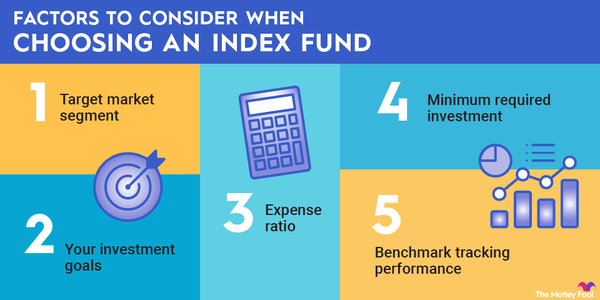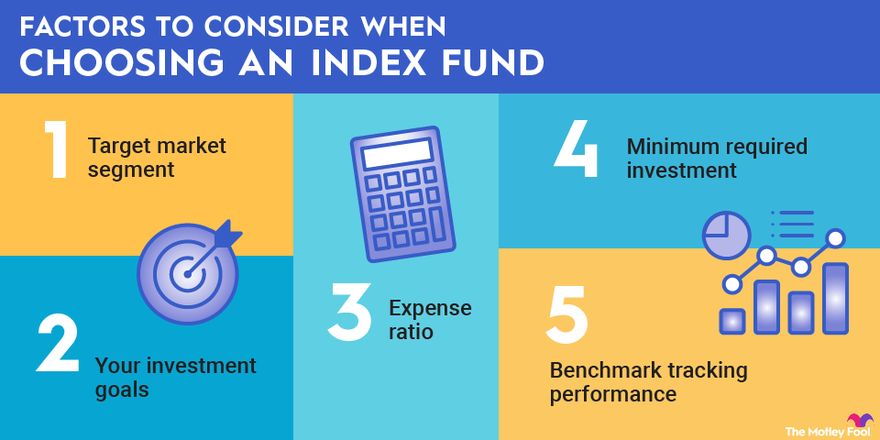
The best index funds can help you build wealth by diversifying your portfolio while minimizing your fees. Investing in an index fund is less risky than investing in individual stocks or bonds because index funds often hold hundreds of financial securities. Index funds spread your investment risk across the stocks or bonds of many different individual companies.

Image source: The Motley Fool.
How to choose an index fund
How to choose an index fund
Index funds hold baskets of investments to track a market index, such as the S&P 500 (SNPINDEX:^GSPC). Index funds are passively managed, meaning the fund’s holdings are entirely determined by the index the fund tracks.
The goal of an index fund is to match the performance of the underlying index. They’re a good choice for long-term investors because you can lock in the returns of the overall stock market or a specific segment of it.
The returns generated by an index fund generally never exceed the performance of the index itself, if only because of index fund expense ratios, which are the annual management fees collected by index fund managers. Since index funds are passively managed, they are actually more likely to outperform funds with active managers over the long term.
An index fund can be either a mutual fund or an exchange-traded fund (ETF). Investors buy shares of mutual funds directly from asset management companies; shares in ETFs are purchased and sold through stock exchanges.
Consider these key factors when picking an index fund to invest in:
- Target market segment: Some index funds confer portfolio exposure to the entire U.S. stock market by tracking indexes such as the S&P 500. Others track narrower indexes focused on specific stock market sectors, industries, countries, or company sizes.
- Your investment goals: Some stock market indexes and, by extension, some index funds track companies with specific characteristics, such as high growth potential, a history of reliable dividend payments, or adherence to environmental, social, and governance (ESG) standards.
- Expense ratio: An index fund’s expense ratio — the percentage of your investment paid annually as a management fee to the fund’s manager — can vary significantly. A good expense ratio for a total stock market index fund is about 0.1% or less; a small number of index funds have expense ratios of 0%. More specialized index funds tend to have higher expense ratios.
- Minimum required investment: Some mutual funds have minimum investments of $1,000 or more. ETF index funds are accessible for the cost of a single share. Many brokers also offer ETFs as fractional shares, allowing you to invest for as little as $1.
- Benchmark tracking performance: How closely an index fund tracks its underlying index can vary. The performances of the best index funds are very closely correlated with their benchmark indexes.

Image source: Getty Images.
Nine best index funds for 2024
Nine best index funds for January 2024
Our picks for the nine best index funds for this year can help you accomplish a variety of investment goals. Plus, they have low expense ratios and low minimum investments.
After a rocky 2022, many of the funds listed below were up significantly in 2023 and are off to a strong start in 2024. But remember: Index investing is about building wealth for the long haul, so try not to focus on short-term ups and downs.
1. Fidelity ZERO Large Cap Index Fund
Investing in S&P 500 index funds is, perhaps, the closest thing to a guaranteed way to build wealth over time. The Fidelity ZERO Large Cap Index Fund (FNILX -0.06%) tracks an index of more than 500 U.S. large-cap stocks and performs very similarly to an S&P 500 index fund.
However, because this fund is not an official S&P 500 index fund, it avoids paying expensive licensing fees to S&P Global (SPGI 0.72%), the index’s parent company. The fund tracks the Fidelity U.S. Large Cap Index as its benchmark.
The “ZERO” in the fund’s name denotes that the expense ratio for this fund is 0%. There’s also no minimum investment, making the fund a good choice for beginning investors.
The fund’s performance closely mirrors that of the S&P 500. The fund finished 2023 with total returns of more than 27% for the year, slightly more than the S&P 500’s total return of 26.29%.
2. Schwab S&P 500 Index Fund
If you want to invest in an official S&P 500 index fund, the Schwab S&P 500 Index Fund (SWPPX -0.07%) is about the cheapest you’ll find. Its expense ratio is 0.02%, meaning you’d annually pay just $0.20 for every $1,000 you invest.
Further, because the investment fee is so low, your returns are virtually identical to the performance of the S&P 500. There’s no minimum investment amount, so you can start investing with as little as $1.
In 2022, the fund fell by more than 18%, almost identical to the S&P 500’s losses for the year. The fund’s total return for 2023 was 26.25%, almost exactly matching the S&P 500’s 26.29% total return for the year.
3. Vanguard Growth ETF
If you want to assume more investment risk in the pursuit of higher rewards, the Vanguard Growth ETF (VUG 1.19%) is a solid choice. The fund tracks the CRSP US Large Cap Growth Index, which performs similarly to the S&P 500 Growth Index. The ETF invests in 208 U.S. large-cap growth stocks. The fund is most heavily concentrated in the following sectors:
Consumer staples and utility stocks each make up less than 1% of the fund’s value. The ETF has a minuscule 0.04% expense ratio. As of Dec. 31, 2023, the fund’s average annual return over five years (before taxes) was more than 19% compared to less than 16% for the S&P 500 over the same period. As tech stocks surge, the VUG has outperformed the S&P 500 in early 2024.
4. SPDR S&P Dividend ETF
A top-performing index fund for income-oriented investors is the SPDR S&P Dividend ETF (SDY 0.42%). The dividend-weighted fund’s benchmark is the S&P High Yield Dividend Aristocrats® Index, which tracks 121 stocks in the S&P Composite 1500 Index with the highest dividend yields. (Dividend Aristocrats® is a registered trademark of Standard & Poor’s Financial Services LLC.)
All the companies owned by the ETF have increased their dividend payments annually for at least 25 consecutive years.
Dividend-paying stocks tend to be less volatile compared to the overall stock market. So, it’s unsurprising that the SPDR S&P 500 Dividend ETF had much smaller losses than the S&P 500 in 2022 or that the SPDR S&P 500 Dividend ETF underperformed compared to the S&P 500 in 2023.
The fund’s 30-day Securities and Exchange Commission (SEC) yield as of Jan. 22, 2024, was 2.59% — significantly higher than the S&P 500’s 1.46%. The expense ratio is also somewhat higher at 0.35%. The fund’s top five holdings are:
- 3M (MMM 0.41%)
- Realty Income (O -0.09%)
- International Business Machines (IBM) (IBM -0.15%)
- Target (TGT -0.71%)
- AbbVie Inc. (ABBV -0.3%)
Several real estate investment trusts (REITs) are represented in the fund. REITs typically pay high dividends because they’re required to disburse at least 90% of their taxable incomes. The ETF is underweighted in tech stocks, which don’t tend to pay generous dividends.
5. Vanguard Real Estate ETF
If you want to invest across the real estate market, the Vanguard Real Estate ETF (VNQ 0.66%) is a solid, low-cost option. With an expense ratio of 0.12%, it’s also, by far, the largest real estate index fund, with total net assets of almost $65 billion.
Its benchmark index is the MSCI US Investable Market Real Estate 25/50 Index, which broadly tracks the U.S. real estate market. Although the index includes a few real estate management and development companies, it consists mostly of equity REITs, which own and operate income-producing real estate.
Because it invests primarily in REITs, the ETF is also attractive to dividend investors. The fund’s 12-month dividend yield as of Jan. 22, 2024, was 4.07%. The Vanguard ETF may also appeal to investors concerned about inflation since real estate is traditionally seen as a hedge against rising prices elsewhere.
6. Vanguard Russell 2000 ETF
The Vanguard Russell 2000 ETF (VTWO 1.74%), which tracks the Russell 2000 (RUSSELLINDICES:^RUT), is a good place to start for investors who want to take advantage of the potential upside of investing in small-cap companies. The fund invests in 1,979 small- and mid-cap companies with a median market capitalization of $2.9 billion.
As of Dec. 31, 2023, the index fund’s largest concentrations were in industrials (18.4%), financials (16%), and consumer discretionary (13.3%). At 0.1%, its expense ratio is relatively low, especially for a fund offering exposure to the companies with the most growth potential. Like its benchmark index, the Vanguard Russell 2000 ETF underperformed the S&P 500 during 2023, with total returns of about 17%.
7. ROBO Global Robotics and Automation Index ETF
Thematic investors wanting to capitalize on a long-term secular trend should check out the ROBO Global Robotics and Automation Index ETF (ROBO 0.82%). The index fund’s benchmark is the Robo Global Robotics and Automation Index, which tracks 77 robotics, automation, and artificial intelligence (AI) companies. It has over $1.3 billion in total net assets and a 0.95% expense ratio, higher than any fund on this list.
The ETF offers investors a way to capture the growth of several booming trends. Robotics offers huge cost savings to companies; the industry is forecast to have a compound annual growth rate of 14.1% through 2032. Interest in AI stocks has also surged since late 2022 when ChatGPT launched. The ETF finished 2023 with a gain of almost 24%.
8. Schwab Emerging Markets Equity ETF
If you want to diversify your portfolio through exposure to high-growth emerging markets but don’t want your risk concentrated in a single economy or region, the Schwab Emerging Markets Equity ETF (SCHE 0.0%) may be a good fit. It tracks the FTSE Emerging Index, a collection of large- and mid-cap stocks in more than 20 developing countries.
The fund has 1,940 holdings, with the largest concentrations in China, India, Taiwan, Brazil, and Saudi Arabia. Its expense ratio is only 0.11%.
The stocks of companies in emerging markets have historically underperformed compared to U.S. stocks. Between 2014 and 2023, the Schwab emerging market funds, on a combined basis, had total returns of about 33%. Meanwhile, the S&P 500 racked up total returns of around 447% during the same decade.
Still, considering about 85% of the world’s population lives in developing countries, investors with a long-term focus and who are comfortable with volatility seriously may want to consider investing in this fund.
Related investing topics
9. Fidelity U.S. Sustainability Index Fund
Investors interested in sustainable investing should check out the Fidelity U.S. Sustainability Index Fund (NASDAQMUTFUND:FITL.X). The fund’s benchmark is the MSCI USA ESG Leaders Index, which tracks the performances of large- and mid-cap domestic stocks with above-average ESG ratings. The index fund has a low expense ratio of 0.11% and no minimum investment amount.
The fund’s largest concentrations, as of Dec. 31, 2023, were in the technology (29.45%), financials (12.11%), and healthcare (12.02%) sectors. The sustainability ETF’s top holdings are:
- Microsoft (MSFT 1.43%)
- Nvidia (NVDA 2.35%)
- Google parent Alphabet (GOOG 0.68%)(GOOGL 0.87%)
- Tesla (TSLA 4.19%)
- Eli Lilly & Co. (LLY 0.9%)
Although ESG funds appeal to those who want to invest with a conscience, a strong ESG focus is also good for returns. Companies that pose little ESG-related risk often deliver superior financial performance, making ESG funds such as the Fidelity U.S. Sustainability Index Fund a good choice for long-term investors.
FAQ
Index fund FAQ
What is the best index fund to invest in?
Although there’s no single best index fund to invest in, a couple of good options are an S&P 500 index fund, which tracks about 80% of the U.S. stock market, or a total stock market fund, which tracks the entire U.S. stock market. These tend to be good choices because they’re well diversified and allow you to lock in the historical growth of the domestic stock market.
Which index fund pays the most?
There are two ways to make money from index funds: sell the investment for a gain or earn dividends. A growth-focused index fund, like the Vanguard Growth ETF, has the potential for big gains.
However, higher rewards come with greater risk, and dividend payments will likely be minimal. If you want investment income, a dividend fund like the SPDR S&P Dividend ETF is a good choice. There’s less potential for big gains, but you can earn reliable dividend income.
Which index fund is best for beginners?
A couple of good choices for beginners are an S&P 500 index fund, like the Schwab S&P 500 Index Fund, or the Fidelity ZERO Large Cap Index Fund, which tracks a similar index. The fees are low (or nonexistent in the case of Fidelity’s fund), and the returns are relatively predictable over long periods of time.
Which S&P 500 index fund is best?
To choose the best S&P 500 index funds, look for a fund that closely tracks the index’s performance and has low investment fees. By these measures, three of the top S&P 500 index funds are the Fidelity 500 Index Fund (NASDAQMUTFUND:FXAIX), the Schwab S&P 500 ETF, and the Vanguard S&P 500 ETF (NYSEARCA:VOO).
What is the safest index fund?
All investments carry some risk, but S&P 500 index funds have been historically safe investments for the long term since the S&P 500 has always delivered positive returns over long periods.
What is the highest-rated index fund?
There’s no single highest-rated index fund. The best index fund will vary based on your investing goal. For example, if you’re seeking investment income, the SPDR S&P Dividend ETF or the Vanguard Real Estate ETF would be good options; if you’re looking for a higher-risk, higher-reward fund, you might consider a growth-focused fund, like the Vanguard Growth ETF.






